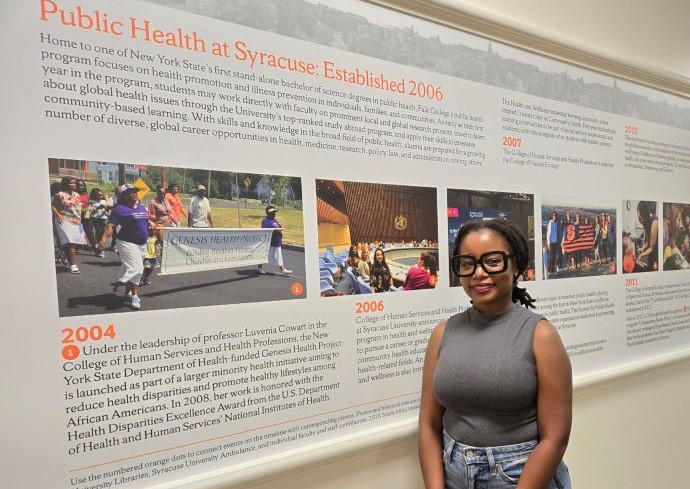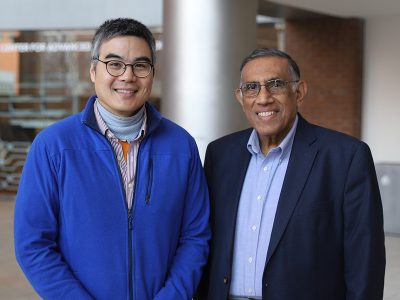Miriam Mutambudzi Chosen as 2024-26 Lender Center Faculty Fellow
A public health professor whose research focuses on social determinants of health has been selected as the 2024-26 Lender Center for Social Justice faculty fellow.
Miriam Mutambudzi will explore how Black adults who reside in historically redlined neighborhoods can experience a disadvantaged occupational life course and subsequent health consequences. Redlining was a discriminatory practice of designating certain neighborhoods, especially predominantly Black ones, as being poor credit risks.
Mutambudzi is an assistant professor of public health at the David B. Falk College of Sport and Human Dynamics. She is also a faculty affiliate of three centers at the Maxwell School of Citizenship and Public Affairs: the Center for Aging and Policy Studies; the Aging Studies Institute; and the Lerner Center for Public Health Promotion.
In addition to Mutambudzi, an interdisciplinary team of student fellows will work on the project. Students from any discipline and background who are excited about community advocacy and social justice are encouraged to apply for the two-year fellowships. Applications are accepted through early October and fellows are chosen before the end of the fall semester. The faculty-student group will present their findings at a community symposium in 2026.
We recently sat down with Mutambudzi to learn more about her project.
Why is this topic important?
This research tackles the ongoing challenges faced by Black communities from the legacy of historical discriminatory housing practices and the subsequent impact of those practices on community members’ employment and health.
While the Fair Housing Act of 1968 was enacted as federal law, it failed to fully dismantle racial discrimination in housing resulting from the practice of redlining. Redlining is a discriminatory practice that began in 1930s America [where] banks and insurance companies refused or limited loans, mortgages and insurance to residents of specific geographic areas—primarily neighborhoods with predominantly Black residents. Residents of redlined areas had limited access to credit and other financial services and were hindered in their efforts to own homes, invest in property or improve their neighborhoods. The results were often urban decay and a perpetuation of poverty in those areas.
While redlining is a historical concept, its effects are very much present today. Its legacy continues to limit many life opportunities, and neighborhoods with predominantly Black residents where that occurred still face social and economic disadvantages.
How do limited employment prospects—or the lack of a good job—affect health issues?
Both employment and discriminatory policies are key factors contributing to racial disparities in health outcomes. Job insecurity, precarity, lower wages and periods of unemployment—which occur more frequently among Black workers—all contribute to income gaps and limit access to good health insurance and quality healthcare.
Young adults from disadvantaged neighborhoods enter the workforce at a significant disadvantage. Job prospects within their communities are scarce, limiting their ability to find work that pays well, offers stability and provides a path for advancement.
This lack of good-quality jobs in their immediate surroundings creates a vicious cycle and the absence of good-quality, stable employment nearby creates a double-edged sword. Not only are opportunities limited, but these young adults also miss out on crucial skill-building and networking chances that come with these jobs. Those factors further restrict their potential, hindering their ability to compete for better opportunities.
In addition, involuntary employment interruptions are more frequent for these young adults and further disrupt their career trajectories. This disparity perpetuates a system where economic mobility becomes nearly impossible for those starting from behind. The cascading constraints imposed by limited job opportunities in disadvantaged neighborhoods have a profound impact on residents’ access to health-promoting resources, creating a cycle that undermines well-being.
For example, limited financial resources often translate to poor housing conditions, which may be overcrowded, poorly maintained and may lack essential amenities. Nutritious and organic foods are generally more expensive and less readily available in “food deserts,” leading to a reliance on cheaper, processed unhealthy foods. The jobs in which Black workers are disproportionately employed may contribute to these health issues, as their work is more likely to be physically and psychologically demanding. All of these factors also combine to contribute to increased risks of health conditions such as obesity, diabetes, respiratory illness and hypertension.

What questions are shaping your research?
There’s much we don’t know about how historically racist policies such as redlining continued to affect the employment trajectories of Black Americans. People can work for 45 years or more in their lives, so it’s essential that we understand the factors that shape occupational trajectories and the subsequent impacts they have on a person’s health.
This project looks at three areas: developing an understanding of historically redlined neighborhoods as predictors of racial disparities in long-term employment trajectories: seeing how employment trajectories may be predictors of chronic health conditions and determining how education might moderate those relationships.
In what ways will the student fellows be involved?
 They will contribute to data analysis and management and will conduct literature reviews to gather relevant reports on social and economic disparities and health outcomes. They’ll help synthesize findings to inform the study’s background and contextual understanding. Students will also have opportunities to engage with the local community since my goal is to work with grassroots organizations that are already addressing the adverse effects of redlining in Syracuse.
They will contribute to data analysis and management and will conduct literature reviews to gather relevant reports on social and economic disparities and health outcomes. They’ll help synthesize findings to inform the study’s background and contextual understanding. Students will also have opportunities to engage with the local community since my goal is to work with grassroots organizations that are already addressing the adverse effects of redlining in Syracuse.
What do you hope to accomplish with this research?
My goal is to illustrate how the historical discriminatory redlining policy that systematically marginalized Black communities still adversely impacts work and health for those communities today, regardless of residents’ educational attainment.
Ultimately, we want to raise awareness regarding the lasting effects of discriminatory practices as fundamental social determinants of health that require much attention, and inspire policymakers, community leaders and the public to drive meaningful action.



